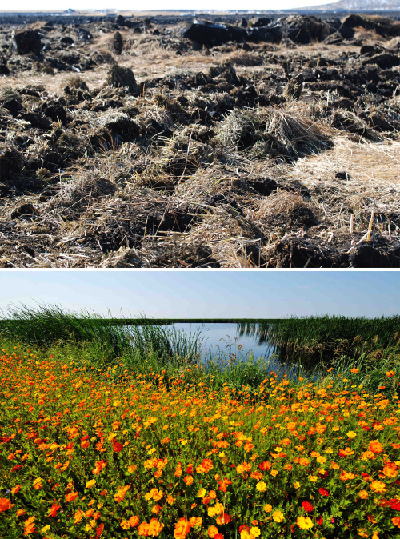|
 |
|
STARK CONTRAST: The pictures reveal what Fujin National Wetland Park in Heilongjiang Province looked like in 2005 (top) and what it looks like today (WANG JIANWEI ) |
Now more wetland areas are under protection. As of the end of 2013, there had been 577 wetland nature reserves and 468 wetland parks in China, found the Second National Wetland Resources Inventory. The survey showed that between 2004 and 2013, wetland areas under protection increased from 30.49 percent to 43.51 percent.
The government has also launched a project to restore farmland to wetland. In northeast China's Jilin Province, many wetlands dried up because of water shortage, which were then reclaimed by farmers to cultivate crops. In 2013, the province started the farmland-back-to-wetland project. Under the project, 1,650 hectares of farmland near Xinlong Reservoir in Baicheng have been restored into wetland. The reservoir dried up years ago, so canals and ditches were dug to channel water from nearby rivers and lakes into the reservoir and surrounding areas.
Lan Hongliang, head of the Forestry Department of Jilin, said that local residents were given a subsidy to resettle into new life and to buy fish hatchlings and fishing tools in an interview with Jilin TV station.
Some individuals have also voluntarily engaged in wetland protection. Wang Jianmin, a middle-aged photographer in Tianjin Municipality, is one of them. For more than two decades, he has taken pictures of wetlands and informed local residents of the importance of wetland and bird protection. Wang said that he has a dream to see the homeland as it was when he was a child.
Calls for a national law
Despite the government's conservation efforts, reclamation of wetland has still occurred.
Zhang Fengjiang, an official of Naolihe Nature Reserve in northeast China's Heilongjiang Province, once admitted in an interview with China Economic Weekly that stopping farmers from reclaiming wetland is "a very challenging job."
He said that every spring, farmers and reserve administrators play a tug of war. Some farmers surreptitiously plow and sow seeds in the wetlands, usually at night. While reserve administrators make efforts to destroy any seedlings they find, farmers often return and sow seeds again and again.
Currently, there is no national law on wetland protection. Zhang said that the absence of such a law makes it difficult for reserve administrators to hold perpetrators liable.
Although 18 out of 34 provinces in China had issued local regulations for wetland protection as of November 2013, it will be difficult to enforce them due to the lack of national laws, wrote Chen Yue, a professor with Kunming-based Southwest Forestry University, in a paper published in January 2014.
The lack of a national law poses great challenges to "effectively regulate the behavior of and relationships between the various stakeholders," Chen wrote.
On March 28, 2013, the State Administration of Forestry (SAF) adopted national rules on wetland protection titled the Management Rules on Wetland Protection.
Ma Guangren, Director General of the SAF's Office of Wetland Conservation and Management, said the management rules regulate the forestry sector, yet it has little binding power over other sectors. As wetland protection calls for the concerted efforts of many sectors, Ma thought a national law will help overcome conflicts of interests between various sectors.
Moreover, Zhang pointed out that although local residents' development activities were restricted after wetland reserves were set up, some of them were not properly compensated for their loss. "This has led to a lack of cooperation on the part of villagers," he said.
In 2010, China began a trial scheme that offered ecological benefit compensation to residents living near wetlands. A state-level fund has been set up for this purpose.
On January 13, 2014, Zhang Yongli, Vice Minister of the SAF, said that wetland protection should be made a performance indicator for Party and government officials, and the government should actively promote the building of a wetland ecological compensation system.
Email us at: wanghairong@bjreview.com | 